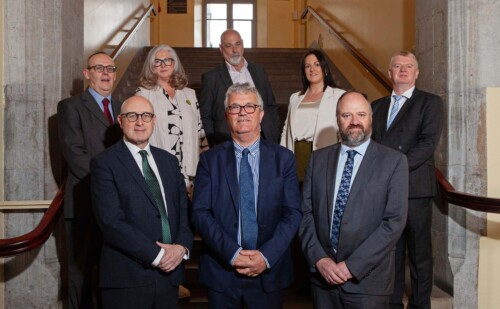Minister Harris announces 22 innovative projects to be funded under Human Capital Initiative
By Maura O'Shea
Posted: 5 October, 2020

Minister for Further and Higher Education, Research, Innovation and Science, Simon Harris, T.D. has today announced 22 projects are to be funded under the Human Capital Initiative.
The projects include the use of virtual laboratories in higher education, a new hub to upskill the building sector on green construction, and the establishment of Creative Futures Academy to support digital and screen culture, cinema, literature and broadcasting, art, design, and fashion.
Innovative methods of teaching and delivery will be promoted on these projects, so that learners will benefit from improved quality and more engaging ways of learning on enterprise-focused courses, providing lifelong learning and upskilling opportunities for all.
Human Capital Initiative Pillar 3, Innovation and Agility is the final Pillar to be announced and commands a total budget of €197 million over the 5-year period, 2020 to 2024.
Minister Harris said: “I am delighted to be able to announce the broad range of projects that will be funded under the HCI Pillar 3.
“These projects will develop and change teaching and learning. This global pandemic has reinforced the need for us all to be agile and diverse.
“Crucially though it requires us to develop new skills and equip the next generation with the critical importance to the economy and the workplace of the future.”
Higher Education Authority CEO, Dr Alan Wall, has congratulated all of the Higher Education institutions receiving funding under the HCI scheme.
“It is great to see the culmination of this process as it represents hundreds of hours of work by the Higher Education Authority working with the Higher Education institutions and our international panel.”
HCI Pillar 3 will deliver 22 projects in higher education institutions, 17 of which involve collaborations between institutions.
Notes for Editor:
Background to Human Capital Initiative:
Announced as part of Budget 2019, the primary objective of the Human Capital Initiative (HCI) is to underpin the provision of additional capacity across the Higher Education Sector to meet priority skill needs for enterprise. It represents an additional investment of €300m (€60m per annum from 2020 to 2024) from the surplus in the National Training Fund in line with recommendations contained in the independent review of the National Training Fund on the use of the surplus and the development of labour market skills.
The HCI will also incentivise continued reform and innovation in third level provision, building on best practice nationally and internationally, strongly supporting innovation in programme design and delivery. It aims to future proof graduates and ensure that there is a greater focus across the whole spectrum of Higher Education course provision on promoting and embedding transversal skills.
The Human Capital Initiative consists of 3 pillars:
Pillar 1: Graduate Conversion and Specialisation Courses
Pillar 2: Additional Places on Undergraduate Provision
Pillar 3: Innovation and Agility
Pillar 3: Innovation and Agility
Human Capital Initiative Pillar 3, Innovation and Agility is the final Pillar to be announced and commands a total budget of €197 million over the 5-year period. The initiative will support innovative and agile proposals from institutions or groups of institutions with potential application and impact across the higher education system. The proposals will align innovation and agility with national strategic objectives, key system objectives for the higher education system, and future skills needs for society and the economy.
Through the projects recommended under this pillar, it is intended that innovative methods of teaching and delivery will be promoted, so that learners will benefit from improved quality and more engaging ways of learning on enterprise-focused courses. The capacity of institutions to anticipate, understand and respond to emerging skills needs of enterprise will be increased, together with the ability of institutions to provide lifelong learning and upskilling opportunities for all.
The projects approved under HCI Pillar 3 were selected by a panel of experts with national and international expertise following a competitive tendering process.
The below table outlines the projects approved for funding under HCI Pillar 3:
| HEI Lead Institution | Title of Application | Collaborative Education Partners | Funding allocated |
| Institute of Technology Tralee | REEdI– Rethinking Engineering Education in Ireland | UL, CIT | € 8,952,142 |
| Institute of Technology Sligo | HigherEd 4.0: Enabling agile responsiveness from Higher Education | GMIT, LYIT | € 12,381,848 |
| Technological University Dublin | CONVENE: Transforming university-enterprise engagement for a new… | UCD | € 17,531,944 |
| Technological University Dublin | GROWTH HUB: | WIT | € 3,496,384 |
| National University of Ireland, Galway | Next Generation Graduates | € 7,570,127 | |
| National College of Art & Design | Creative Futures Academy: | IADT, UCD | € 10,018,526 |
| Waterford Institute of Technology | Strengthening and Protecting the Funds Industry in Ireland | CIT, State Street, BNY Melon | € 2,048,180 |
| University College Cork | Sustainability in Enterprise: Delivering a Low Carbon Future | IT Sligo, MU | € 3,913,440 |
| Cork Institute of Technology | CYBER-SKILLS | UL, TUD, UCD, ITRALEE | € 8,128,623 |
| Dublin City University (IUA) | Towards a Multi-Campus Micro-Credentials (MC2) system | DCU, MU, UCC, TCD, UCD, UL, NUIG | € 12,252,374 |
| Institute of Technology Carlow (IUA and Thea) | Realising the potential of recognition of prior learning and lifelong learning in Irish higher education | ITC, CIT, DKIT, TUD, LIT, GMIT, AIT, LYIT, ITS, WIT, UCC, TCD, UL, NUIG, DCU,MU, UCD, THEA, IUA IADT ITT | € 6,904,176 |
| University of Limerick | UL@Work | € 16,297,375 | |
| University College Cork | The iEd Hub: Holistic education for enterprise, with enterprise in Healthcare and Biopharma | CIT | € 8,728,936 |
| Waterford Institute of Technology | AMASE: Additive Manufacturing Advancing the South East | IT Carlow & Industry Partners | € 2,152,349 |
| Maynooth University | Virtual Laboratories in higher education as an innovative pedagogical tool | AIT, DKIT, UCC, DCU | € 2,971,700 |
| Dublin City University | DCU Futures – A radical restructuring of the DCU Undergraduate Curriculum | € 19,917,668 | |
| Limerick Institute of Technology | Digital Academy for Sustainable Built Environment (DASBE) | AIT, GMIT, TEA, IGBC | € 7,503,106 |
| Institute of Technology Carlow | Centre for Insurance, Risk and Data Analytics Studies (CIRDAS) | LYIT | € 1,725,343 |
| Royal College of Surgeons in Ireland | Enabling Future Pharma ‘Beyond the Pill’ | € 7,835,086 | |
| Trinity College Dublin | Next generation teaching and learning for the changing needs of society and enterprise | € 21,011,362 | |
| University College Dublin | The ADVANCE Centre for Professional Education | IT Sligo, TUD | € 14,070,668 |
| Institute of Technology Carlow | Postgraduate Certificate in Innovative Materials for Industry 4.0 | DCU | € 2,568,083 |


